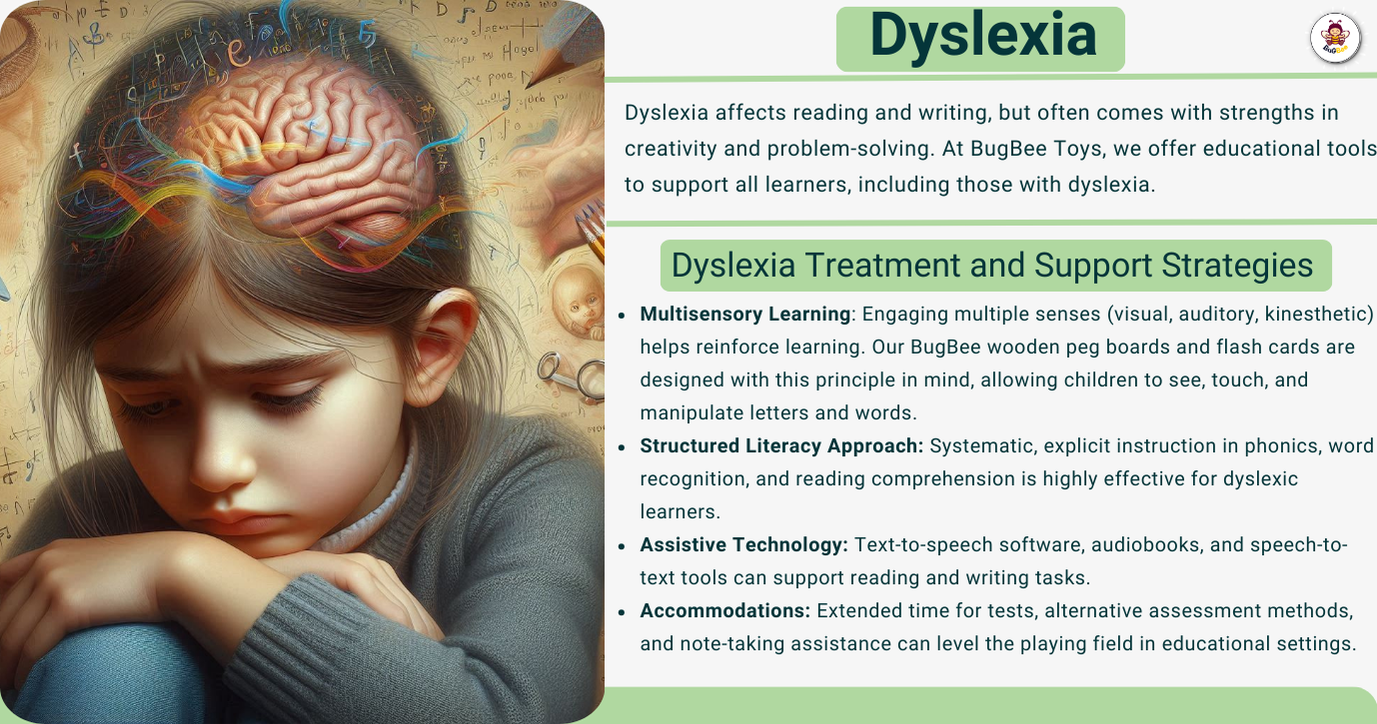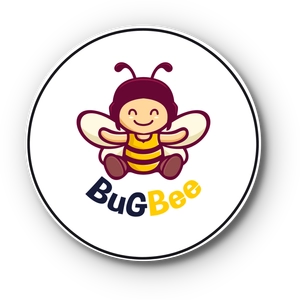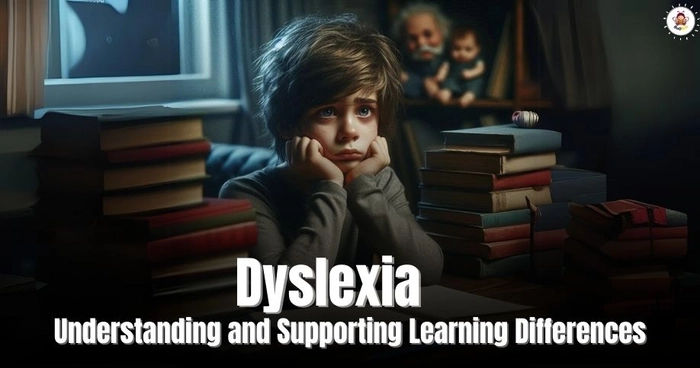Dyslexia
Dyslexia is a common learning difference that affects reading, writing, and spelling skills. Despite its challenges, individuals with dyslexia often possess unique strengths in creativity, problem-solving, and visual thinking. At BugBee Toys, we're committed to providing educational tools that support all learners, including those with dyslexia.
What is Dyslexia?
Dyslexia is a neurological condition that impacts the way the brain processes written and spoken language. It's not related to intelligence or lack of effort - many highly successful individuals have dyslexia. The condition affects about 20% of the population, making it one of the most common learning differences.
Dyslexia meaning in Hindi: डिस्लेक्सिया (Disaleksiya)
Dyslexia meaning in Tamil: வாசிப்புக் குறைபாடு (Vācippuk kuṟaipāṭu)
Recognizing Dyslexia Symptoms
Early identification of dyslexia is crucial for providing appropriate support. Common symptoms include:
- Difficulty with phonological awareness (recognizing and manipulating sounds in words)
- Trouble with rapid naming of familiar objects or colors
- Struggles with reading fluency and comprehension
- Spelling difficulties
- Challenges with writing and organizing thoughts on paper
- Difficulty remembering sequences or following multi-step instructions
It's important to note that dyslexia manifests differently in each individual. Some may excel in certain areas while struggling in others.
Dyslexia Definition and Diagnosis
The International Dyslexia Association defines dyslexia as "a specific learning disability that is neurobiological in origin... characterized by difficulties with accurate and/or fluent word recognition and by poor spelling and decoding abilities".
A formal diagnosis typically involves comprehensive assessments by educational psychologists or specialized learning disability experts. These evaluations examine various aspects of reading, writing, and language processing skills.

Dyslexia Tests and Screening
While only professionals can diagnose dyslexia, there are screening tools that can help identify potential signs:
- Rapid Automatized Naming (RAN) tests
- Phonological awareness assessments
- Reading fluency and comprehension evaluations
- Writing and spelling assessments
Early screening is beneficial, as it allows for timely intervention and support.
Effective Dyslexia Treatment and Support Strategies
While dyslexia is a lifelong condition, various strategies and interventions can significantly improve reading and writing skills:
- Multisensory Learning: Engaging multiple senses (visual, auditory, kinesthetic) helps reinforce learning. Our BugBee wooden peg boards and flash cards are designed with this principle in mind, allowing children to see, touch, and manipulate letters and words.
- Structured Literacy Approach: Systematic, explicit instruction in phonics, word recognition, and reading comprehension is highly effective for dyslexic learners.
- Assistive Technology: Text-to-speech software, audiobooks, and speech-to-text tools can support reading and writing tasks.
- Accommodations: Extended time for tests, alternative assessment methods, and note-taking assistance can level the playing field in educational settings.
How BugBee Educational Toys Support Dyslexic Learners
Our carefully designed educational toys cater to diverse learning needs, including those of dyslexic children:
- Wooden Peg Boards: These tactile tools help reinforce letter recognition and phonics skills. The physical act of placing pegs enhances memory and letter-sound connections.
- Flash Cards: Our visually appealing flash cards support rapid naming skills and vocabulary development. They're designed with dyslexia-friendly fonts and clear, high-contrast images.
- Tracing Boards: These tools improve fine motor skills and letter formation, crucial for writing development in dyslexic learners.
- Educational Games: Our Jenga-style games incorporate learning elements, making practice fun and engaging for all children, including those with dyslexia.
FAQs About Dyslexia
-
Can dyslexia be cured?
Dyslexia is a lifelong condition, but with appropriate support and interventions, individuals can develop strong reading and writing skills. -
Is dyslexia related to intelligence?
No, dyslexia is not linked to intelligence. Many highly intelligent and successful individuals have dyslexia. -
At what age can dyslexia be diagnosed?
While signs may be noticeable in early childhood, a formal diagnosis is typically made around age 7 or 8 when reading skills are more developed. -
Are there any strengths associated with dyslexia?
Yes, many individuals with dyslexia excel in areas such as creative thinking, problem-solving, and visual-spatial reasoning. -
How can parents support a child with dyslexia?
Encourage reading, provide multisensory learning opportunities, advocate for school accommodations, and focus on the child's strengths.
Supporting Your Child's Learning Journey
At BugBee Toys, we're dedicated to creating educational tools that support all learners, including those with dyslexia. Our products are designed to make learning engaging, multisensory, and effective.
Visit our website at bugbeetoys.com to explore our range of educational toys and resources. For personalized recommendations or questions, please don't hesitate to contact our team through our online form or Whatsapp at Whatsapp Us
Remember, every child's learning journey is unique. With the right support and tools, children with dyslexia can thrive and reach their full potential.



